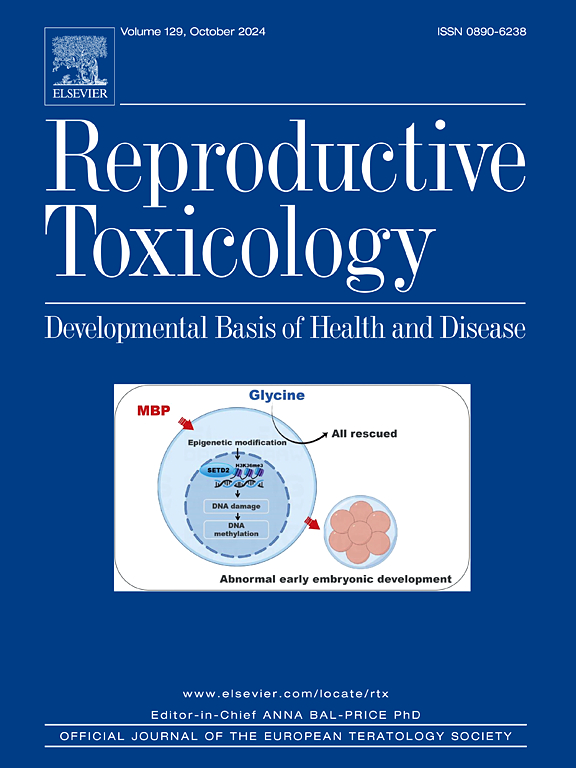通过网络毒理学和分子对接探讨人工甜味剂治疗多囊卵巢综合征的潜在机制。
IF 2.8
4区 医学
Q2 REPRODUCTIVE BIOLOGY
引用次数: 0
摘要
多囊卵巢综合征(PCOS)是一种复杂的内分泌和代谢疾病,在育龄妇女中越来越普遍。通常用作糖替代品的人工甜味剂,因其可能破坏代谢和荷尔蒙平衡而受到密切关注。本研究探讨了七种人工甜味剂(阿斯巴甜、糖精、三氯蔗糖、安赛蜜- k、环己基氨基磺酸钠、纽甜和阿利甜)对多囊卵巢综合征发展的影响机制。通过网络毒理学和分子对接方法,我们确定了甜味剂相关基因和多囊卵巢综合征相关基因之间共有的85个共同靶点。利用基因本体(GO)和京都基因与基因组百科全书(KEGG)途径进行富集分析,揭示了与炎症、胰岛素抵抗和类固醇生物合成的联系,特别是TNF信号通路、AGE-RAGE信号通路和AMPK途径。值得注意的是,在分子对接模拟中,TNF、STAT3和IFNG等关键靶点与人工甜味剂表现出高度的结合亲和力。这些结果表明,人工甜味剂可能通过炎症和代谢途径加剧多囊卵巢综合征的进展,强调需要进一步的实验验证。本文章由计算机程序翻译,如有差异,请以英文原文为准。
Exploring potential mechanisms of artificial sweeteners in polycystic ovary syndrome through network toxicology and molecular docking
Polycystic ovary syndrome (PCOS) is a complex endocrine and metabolic disorder increasingly prevalent among women of reproductive age. Artificial sweeteners, commonly used as sugar substitutes, are now under scrutiny for their potential disruption of metabolic and hormonal equilibrium. This investigation delves into the molecular mechanisms through which seven artificial sweeteners (aspartame, saccharin, sucralose, acesulfame-K, sodium cyclamate, neotame, and alitame) may impact the development of PCOS. By employing network toxicology and molecular docking methodologies, we identified 85 common targets shared between genes associated with sweeteners and those linked to PCOS. Enrichment analyses using Gene Ontology (GO) and Kyoto Encyclopedia of Genes and Genomes (KEGG) pathways unveiled connections to inflammation, insulin resistance, and steroid biosynthesis, particularly implicating pathways such as TNF signaling, AGE-RAGE signaling, and the AMPK pathway. Notably, key targets like TNF, STAT3, and IFNG displayed high binding affinities with artificial sweeteners in molecular docking simulations. These results suggest a potential role for artificial sweeteners in exacerbating PCOS progression through inflammatory and metabolic pathways, underscoring the need for further experimental validation.
求助全文
通过发布文献求助,成功后即可免费获取论文全文。
去求助
来源期刊

Reproductive toxicology
生物-毒理学
CiteScore
6.50
自引率
3.00%
发文量
131
审稿时长
45 days
期刊介绍:
Drawing from a large number of disciplines, Reproductive Toxicology publishes timely, original research on the influence of chemical and physical agents on reproduction. Written by and for obstetricians, pediatricians, embryologists, teratologists, geneticists, toxicologists, andrologists, and others interested in detecting potential reproductive hazards, the journal is a forum for communication among researchers and practitioners. Articles focus on the application of in vitro, animal and clinical research to the practice of clinical medicine.
All aspects of reproduction are within the scope of Reproductive Toxicology, including the formation and maturation of male and female gametes, sexual function, the events surrounding the fusion of gametes and the development of the fertilized ovum, nourishment and transport of the conceptus within the genital tract, implantation, embryogenesis, intrauterine growth, placentation and placental function, parturition, lactation and neonatal survival. Adverse reproductive effects in males will be considered as significant as adverse effects occurring in females. To provide a balanced presentation of approaches, equal emphasis will be given to clinical and animal or in vitro work. Typical end points that will be studied by contributors include infertility, sexual dysfunction, spontaneous abortion, malformations, abnormal histogenesis, stillbirth, intrauterine growth retardation, prematurity, behavioral abnormalities, and perinatal mortality.
 求助内容:
求助内容: 应助结果提醒方式:
应助结果提醒方式:


